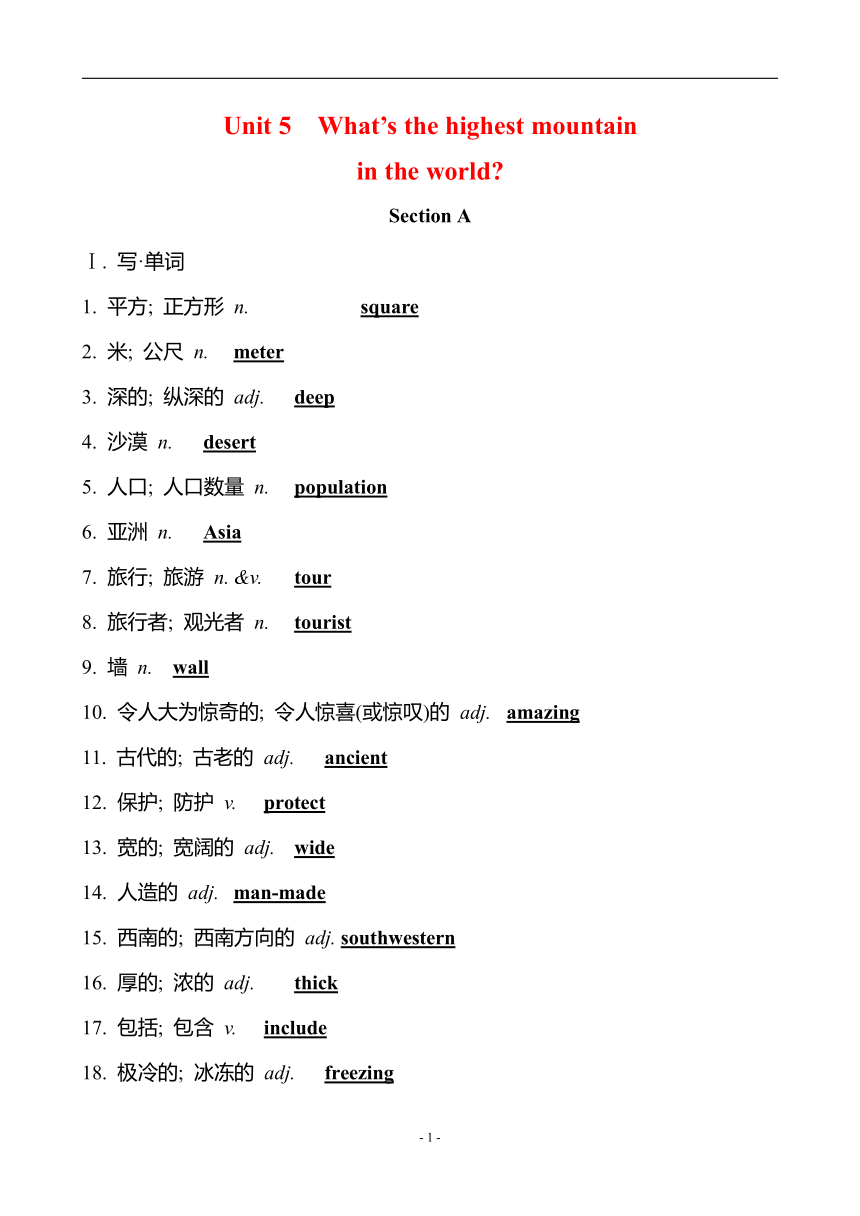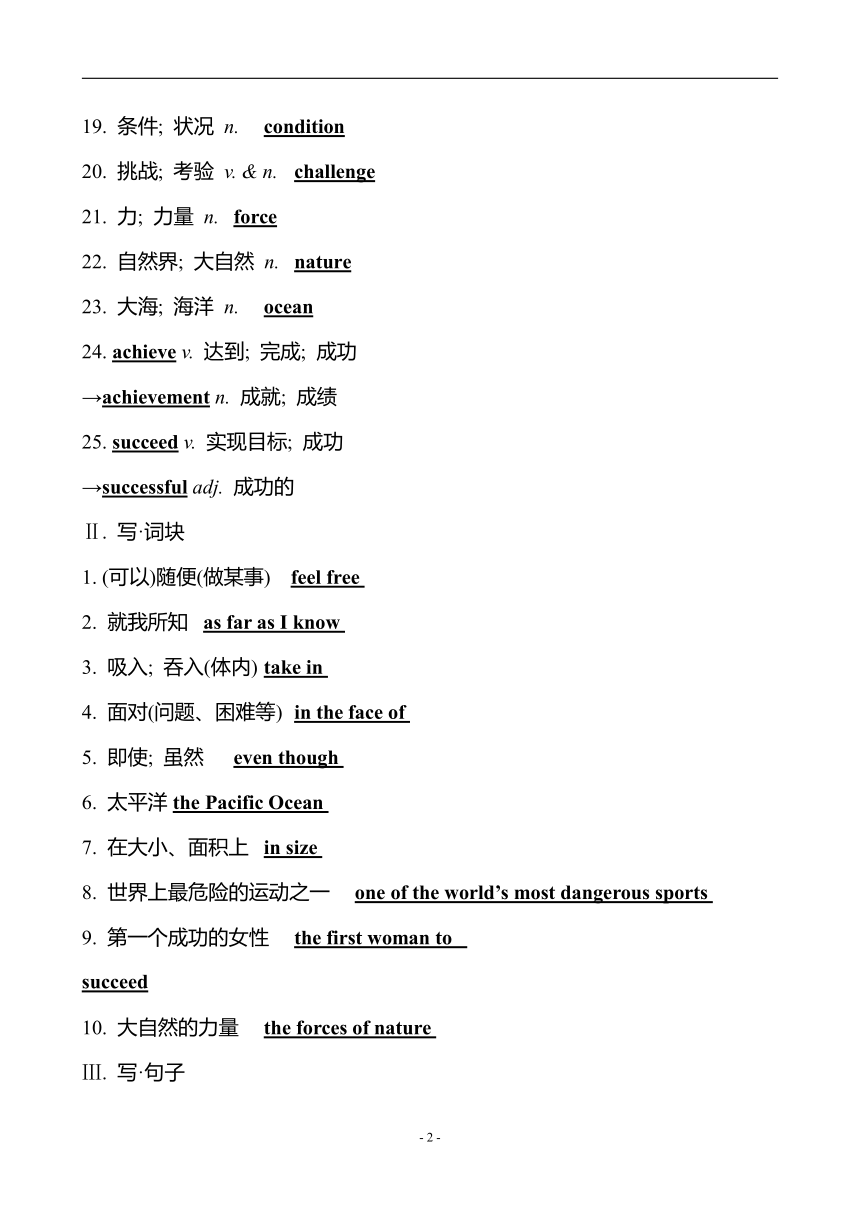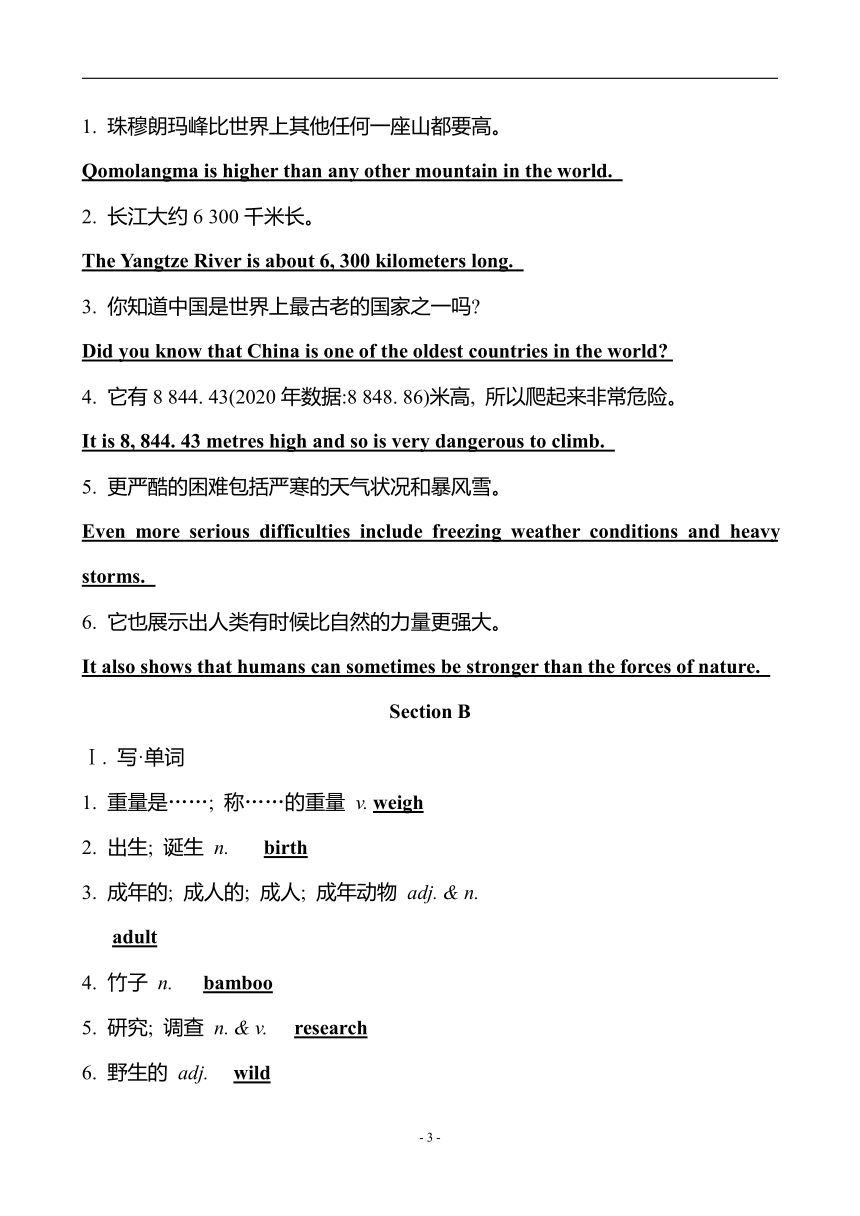Unit 5 What’s the highest mountain in the world? 知识清单 2024-2025学年英语鲁教版八年级上册
文档属性
| 名称 | Unit 5 What’s the highest mountain in the world? 知识清单 2024-2025学年英语鲁教版八年级上册 |

|
|
| 格式 | docx | ||
| 文件大小 | 27.8KB | ||
| 资源类型 | 教案 | ||
| 版本资源 | 鲁教版 | ||
| 科目 | 英语 | ||
| 更新时间 | 2024-06-13 07:04:31 | ||
图片预览



文档简介
Unit 5 What’s the highest mountain
in the world
Section A
Ⅰ. 写·单词
1. 平方; 正方形 n. square
2. 米; 公尺 n. meter
3. 深的; 纵深的 adj. deep
4. 沙漠 n. desert
5. 人口; 人口数量 n. population
6. 亚洲 n. Asia
7. 旅行; 旅游 n. &v. tour
8. 旅行者; 观光者 n. tourist
9. 墙 n. wall
10. 令人大为惊奇的; 令人惊喜(或惊叹)的 adj. amazing
11. 古代的; 古老的 adj. ancient
12. 保护; 防护 v. protect
13. 宽的; 宽阔的 adj. wide
14. 人造的 adj. man-made
15. 西南的; 西南方向的 adj. southwestern
16. 厚的; 浓的 adj. thick
17. 包括; 包含 v. include
18. 极冷的; 冰冻的 adj. freezing
19. 条件; 状况 n. condition
20. 挑战; 考验 v. & n. challenge
21. 力; 力量 n. force
22. 自然界; 大自然 n. nature
23. 大海; 海洋 n. ocean
24. achieve v. 达到; 完成; 成功
→achievement n. 成就; 成绩
25. succeed v. 实现目标; 成功
→successful adj. 成功的
Ⅱ. 写·词块
1. (可以)随便(做某事) feel free
2. 就我所知 as far as I know
3. 吸入; 吞入(体内) take in
4. 面对(问题、困难等) in the face of
5. 即使; 虽然 even though
6. 太平洋 the Pacific Ocean
7. 在大小、面积上 in size
8. 世界上最危险的运动之一 one of the world’s most dangerous sports
9. 第一个成功的女性 the first woman to
succeed
10. 大自然的力量 the forces of nature
Ⅲ. 写·句子
1. 珠穆朗玛峰比世界上其他任何一座山都要高。
Qomolangma is higher than any other mountain in the world.
2. 长江大约6 300千米长。
The Yangtze River is about 6, 300 kilometers long.
3. 你知道中国是世界上最古老的国家之一吗
Did you know that China is one of the oldest countries in the world
4. 它有8 844. 43(2020年数据:8 848. 86)米高, 所以爬起来非常危险。
It is 8, 844. 43 metres high and so is very dangerous to climb.
5. 更严酷的困难包括严寒的天气状况和暴风雪。
Even more serious difficulties include freezing weather conditions and heavy storms.
6. 它也展示出人类有时候比自然的力量更强大。
It also shows that humans can sometimes be stronger than the forces of nature.
Section B
Ⅰ. 写·单词
1. 重量是……; 称……的重量 v. weigh
2. 出生; 诞生 n. birth
3. 成年的; 成人的; 成人; 成年动物 adj. & n.
adult
4. 竹子 n. bamboo
5. 研究; 调查 n. & v. research
6. 野生的 adj. wild
7. 政府; 内阁 n. government
8. 鲸 n. whale
9. 油; 食用油; 石油 n. oil
10. 巨大的; 极多的 adj. huge
11. danger n. 危险→endangered adj. 濒危的
12. keep v. 保存; 保管
→keeper n. 饲养员; 保管人
13. wake v. 醒来; 叫醒
→awake adj. 醒着
14. excite v. 使兴奋
→excitement n. 激动; 兴奋
15. ill adj. 有病的→illness n. 疾病; 病
16. protect v. 保护; 防护
→protection n. 保护; 保卫
Ⅱ. 写·词块
1. 出生时 at birth
2. 到达(某数量、程度等); 至多有; 不多于
up to
3. 走路时撞着 walk into
4. 绊倒 fall over
5. 大约 or so
6. 活到 live up to
7. 重很多倍 weigh many times
8. 为……作准备 prepare for
9. 照顾 take care of
10. 实际上 in fact
11. 对……来说是特别的
be special to
12. 少于; 不到 less than/fewer than
13. 死于 die from
14. ……的重要性 the importance of
15. 做研究 do research
16. ……的习性 the habits of
Ⅲ. 写·句子
1. 这头大象比这只熊猫高200厘米。
This elephant is 200 cm taller than this panda.
2. 一只成年熊猫比一只熊猫宝宝重很多倍。
An adult panda weighs many times more than a baby panda.
3. 熊猫能活到20到30岁。
A panda can live up to 20 to 30 years.
4. 我照顾它们就像是它们是我自己的孩子。
I take care of them like they’re my own babies.
5. 熊猫变得如此受欢迎以至于它们现在是中国的标志。
Pandas have become so popular that they are now a symbol of China.
6. 科学家们说如今生活在森林里的熊猫不足2 000只。
Scientists say there are now fewer than 2, 000 pandas living in the forests.
7. 这些(熊猫)幼崽经常死于疾病并且生存时间不是很长。
The babies often die from illnesses and do not live very long.
8. 人类开始砍伐这些森林。
Humans started to cut down these forests.
9. 我们都希望将来有更多的熊猫。
We all hope that in the future there will be a lot more pandas.
- 6 -
in the world
Section A
Ⅰ. 写·单词
1. 平方; 正方形 n. square
2. 米; 公尺 n. meter
3. 深的; 纵深的 adj. deep
4. 沙漠 n. desert
5. 人口; 人口数量 n. population
6. 亚洲 n. Asia
7. 旅行; 旅游 n. &v. tour
8. 旅行者; 观光者 n. tourist
9. 墙 n. wall
10. 令人大为惊奇的; 令人惊喜(或惊叹)的 adj. amazing
11. 古代的; 古老的 adj. ancient
12. 保护; 防护 v. protect
13. 宽的; 宽阔的 adj. wide
14. 人造的 adj. man-made
15. 西南的; 西南方向的 adj. southwestern
16. 厚的; 浓的 adj. thick
17. 包括; 包含 v. include
18. 极冷的; 冰冻的 adj. freezing
19. 条件; 状况 n. condition
20. 挑战; 考验 v. & n. challenge
21. 力; 力量 n. force
22. 自然界; 大自然 n. nature
23. 大海; 海洋 n. ocean
24. achieve v. 达到; 完成; 成功
→achievement n. 成就; 成绩
25. succeed v. 实现目标; 成功
→successful adj. 成功的
Ⅱ. 写·词块
1. (可以)随便(做某事) feel free
2. 就我所知 as far as I know
3. 吸入; 吞入(体内) take in
4. 面对(问题、困难等) in the face of
5. 即使; 虽然 even though
6. 太平洋 the Pacific Ocean
7. 在大小、面积上 in size
8. 世界上最危险的运动之一 one of the world’s most dangerous sports
9. 第一个成功的女性 the first woman to
succeed
10. 大自然的力量 the forces of nature
Ⅲ. 写·句子
1. 珠穆朗玛峰比世界上其他任何一座山都要高。
Qomolangma is higher than any other mountain in the world.
2. 长江大约6 300千米长。
The Yangtze River is about 6, 300 kilometers long.
3. 你知道中国是世界上最古老的国家之一吗
Did you know that China is one of the oldest countries in the world
4. 它有8 844. 43(2020年数据:8 848. 86)米高, 所以爬起来非常危险。
It is 8, 844. 43 metres high and so is very dangerous to climb.
5. 更严酷的困难包括严寒的天气状况和暴风雪。
Even more serious difficulties include freezing weather conditions and heavy storms.
6. 它也展示出人类有时候比自然的力量更强大。
It also shows that humans can sometimes be stronger than the forces of nature.
Section B
Ⅰ. 写·单词
1. 重量是……; 称……的重量 v. weigh
2. 出生; 诞生 n. birth
3. 成年的; 成人的; 成人; 成年动物 adj. & n.
adult
4. 竹子 n. bamboo
5. 研究; 调查 n. & v. research
6. 野生的 adj. wild
7. 政府; 内阁 n. government
8. 鲸 n. whale
9. 油; 食用油; 石油 n. oil
10. 巨大的; 极多的 adj. huge
11. danger n. 危险→endangered adj. 濒危的
12. keep v. 保存; 保管
→keeper n. 饲养员; 保管人
13. wake v. 醒来; 叫醒
→awake adj. 醒着
14. excite v. 使兴奋
→excitement n. 激动; 兴奋
15. ill adj. 有病的→illness n. 疾病; 病
16. protect v. 保护; 防护
→protection n. 保护; 保卫
Ⅱ. 写·词块
1. 出生时 at birth
2. 到达(某数量、程度等); 至多有; 不多于
up to
3. 走路时撞着 walk into
4. 绊倒 fall over
5. 大约 or so
6. 活到 live up to
7. 重很多倍 weigh many times
8. 为……作准备 prepare for
9. 照顾 take care of
10. 实际上 in fact
11. 对……来说是特别的
be special to
12. 少于; 不到 less than/fewer than
13. 死于 die from
14. ……的重要性 the importance of
15. 做研究 do research
16. ……的习性 the habits of
Ⅲ. 写·句子
1. 这头大象比这只熊猫高200厘米。
This elephant is 200 cm taller than this panda.
2. 一只成年熊猫比一只熊猫宝宝重很多倍。
An adult panda weighs many times more than a baby panda.
3. 熊猫能活到20到30岁。
A panda can live up to 20 to 30 years.
4. 我照顾它们就像是它们是我自己的孩子。
I take care of them like they’re my own babies.
5. 熊猫变得如此受欢迎以至于它们现在是中国的标志。
Pandas have become so popular that they are now a symbol of China.
6. 科学家们说如今生活在森林里的熊猫不足2 000只。
Scientists say there are now fewer than 2, 000 pandas living in the forests.
7. 这些(熊猫)幼崽经常死于疾病并且生存时间不是很长。
The babies often die from illnesses and do not live very long.
8. 人类开始砍伐这些森林。
Humans started to cut down these forests.
9. 我们都希望将来有更多的熊猫。
We all hope that in the future there will be a lot more pandas.
- 6 -
同课章节目录
- Unit 1 Could you please clean your room?
- Section A
- Section B
- Unit 2 Why don't you talk to your parents?
- Section A
- Section B
- Unit 3 What were you doing when the rainstorm came
- Section A
- Section B
- Unit 4 An old man tried to move the mountains.
- Section A
- Section B
- Unit 5 What's the highest mountain in the world?
- Section A
- Section B
- Unit 6 Have you read Treasure Island yet?
- Section A
- Section B
- Unit 7 Have you ever been to a museum?
- Section A
- Section B
- Unit 8 I've had this bike for three years.
- Section A
- Section B
